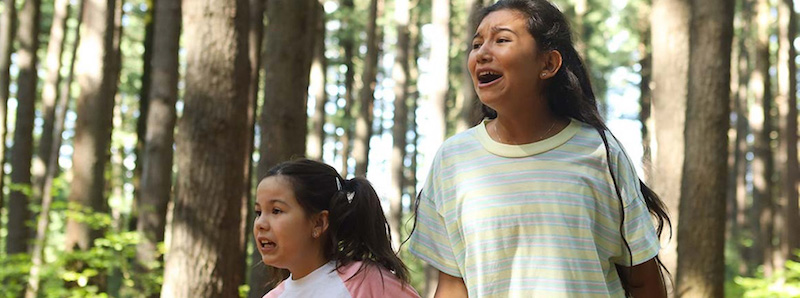 |
|||||
|
|
|
|
|
|
|
 |
|||||
|
|
|
|
|
|
|
| Réalisé par Tracey Deer |
| Canada, 2020 (fiction, 92 minutes, couleurs, anglais / français) |

|
| Image : © Mongrel Media |
|
Description du film [en anglais] : « Inspired by her own childhood, writer-director Tracey Deer's debut feature tells the story of a young Mohawk girl in Kanehsatà:ke amidst the 1990 Oka Crisis. A refreshing look at the lives of Indigenous youth and families that's told with heartbreaking honesty, the film brings awareness to the oppression and discrimination Indigenous people continue to face 30 years later. While the ongoing standoff forces her to grow up faster than she deserves, 12-year-old Beans (Kiawentiio, in a phenomenal performance) is bright and brave as she cares for her younger sister and discovers herself and her place in the community. Timely and touching, Beans is a powerful reminder of the resilience, beauty, and love Indigenous communities hold. » -- Saharla Ugas (source) |
| Générique (partiel) : | |
| Scénario : | Tracey Deer, Meredith Vuchnich |
| Produit par : | Anne-Marie Gélinas, Ken Proulx, Meredith Vuchnich, Justine Whyte |
| Interprètes principaux : | Kiawentiio, Violah Beauvais, Rainbow Dickerson, Joel Montgrand, Paulina Alexis, D'Pharaoh Woon-A-Tai, Jay Cardinal Villeneuve, Taio Gélinas, Caroline Gelinas, Dawn Ford, Kelly Beaudoin, Brittany LeBorgne, Ida Labillois-Montour, Adam LeBlanc, Emilie Paquet, Angie Reid, Sebastien Beaulac, Michel Eid, Frank Marrs, Sara Sue Vallee |
| Images : | Marie Davignon |
| Montage images : | Sophie Farkas Bolla |
| Musique : | Mario Sévigny, Jayli Wolf |
| Société de production : | EMA Films |
« One of the most powerful scenes in the film [Beans] depicts white men throwing rocks at the car in which Beans, her little sister and mom are sitting in a traffic jam, and the police don't do anything to stop the attack. So that is something that is directly out of my own experience. The way I shot it, I wanted us to stay inside the car and really have the audience experience it the way we did. It was very hard to revisit that time, to put it into words in the script. And I really did dread having to re-create it. [...] In that moment, as a child, I really felt like I didn't matter. Nobody was arrested that day. The cops did not stop anyone that day and to my 12-year-old brain [the message was] that I didn't matter. And by being able to tell the story, and share it, I'm telling that little girl that I do matter, our stories matter, what we experience matters. »
-- Tracey Deer
(source)
« Touchant récit initiatique sur fond de crise politique, Beans comporte des scènes qui font mal. Des scènes qui font honte. Que l'on connaisse ou non dans le détail ce qui s'est passé à l'été 1990, qui, en dehors de ceux qui en ont été à la fois les témoins et les victimes, se rappelle les insultes racistes des Blancs proférées à l'endroit des Autochtones ? Des gestes d'une violence inouïe portés contre cette communauté qui ne souhaitait que protéger une terre sacrée ? Tracey Deer, elle, s'en souvient. »
-- Manon Dumais
(source)
« C'est dans ce délicat équilibre entre franchise, sensibilité et quelque chose qu'on a envie d'appeler l'espoir que [Tracey Deer] parvient à créer un film fort, où tout sonne juste. Beans est d'ailleurs admirablement servi par ses interprètes, criants de vérité. »
-- Alexandre Vigneault
(source)
« The combination of actual news footage and fictional events is not always seamless in Beans, the first narrative feature to focus on the Oka Crisis, and the story's logistics, geography and timeline could be clearer. Even so, Mohawk director Tracey Deer, who lived through the violent 78-day conflict as a 12-year-old, has made a film that's eye-opening. Beyond her firsthand understanding of indigenous people's struggles, she's keenly attuned to girlhood growing pains—well captured in the expressive and engaging performance by Kiawentiio, leading a strong cast. The drama ends on a note of hard-won hope, its depictions of racist aggression, both real and re-enacted, shining a harsh light on the ugliness of mob-mentality bullying. »
-- Sheri Linden
(source)
« Beans is exactly what happens when you empower storytellers from a community who've had stories told about them forever, but rarely have had the opportunity to tell them themselves. »
-- Jesse Wente
(source)
|
|
|
|
|
|
|